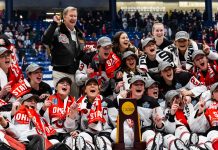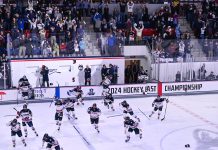Last Year
Cornell was just about as good as you could hope for, dropping consecutive games only once all year during a single three-game losing streak in early February. The only problem was, Yale was just slightly better.
The Big Red played classic Big Red hockey, scoring modestly but defending with ferocious efficiency en route to another NCAA berth. Following a gritty three-game tussle with Rensselaer in the league quarterfinals, the Ithacans upended Princeton in double-overtime of the semis before wilting on tired legs against a fresher Yale side in the ECAC Championship.
Cornell then advanced further than its two ECAC Hockey brethren in the national tourney, slipping past Northeastern in the first round before caving to Cinderella Bemidji State in the regional finale.
Junior Colin Greening led the team with 15 goals, but sophomore Riley Nash took the team point title with 13 goals and 35 points. Seniors Evan Barlow and Michael Kennedy each eclipsed the 10-goal mark as well, and junior Blake Gallagher pumped 21 assists into the offense throughout a productive campaign.
Ben Scrivens had another Ben Scrivens year: 36 games, .931 save rate and a 1.81 goals against average.
This Year
Scrivens is back. The special teams remain overwhelmingly cohesive. The seven departed seniors from last year’s squad included two blue-liners, a goalie and four forwards … a nice balance, and it should leave most of head coach Mike Schafer’s units intact.
“Our goaltending coming back is obviously the same,” Schafer said. “Our power play coming back, with the exception of Evan Barlow … the special teams will be pretty much the same. We brought a big freshman class in, and I think the area that is going to be really critical to us is how much our players develop from last year … guys like Sean Collins and Patrick Kennedy and Locke Jillson and different guys that can contribute offense, how much they will step up to contribute this year. You hope that certain members of the freshman group can contribute, but it’s twofold: I think the biggest difference can come from having a lot more depth offensively.”
Speaking of the freshmen:
“It’s a real big class,” Schafer said. “With Braden Birch and Nick D’Agostino coming in, they give us more size and speed than we had last year with those guys at 6-3 and 6-4 that can really skate and get up and down the ice. We get great depth from our freshman class, especially up front with guys that are really proven offensive players in Eric Axell and John Esposito and Greg Miller. You go through the group of freshmen that have proven they can chip in offensively, and it’s just a matter of how they’ll adjust to college hockey.”
Despite losing a fair number of forwards, Schafer predicts a smooth transition for his front lines.
“The leadership is back up front, so we can put nine guys up front that played a lot last year,” he said. “We can put those guys up right away, and they’ll give us a lot of experience and a lot of leadership. The fact that we’ve got a lot of guys returning at multiple different positions (leaves us with fewer questions) and gives us a lot of leadership.”
On defense, “you’ve got guys like Brendon Nash and Justin Krueger, two big, mobile, very very good hockey players who’ve played a lot of minutes for us over the years, and you start to go down the classes at Mike Devin and … Keir Ross and Sean Whitney, I think we’ve got a lot of balance and we’re not loaded up on one class,” Schafer said.
“When you want to compete across the country, you want guys that are mobile and can get up in the play. That’s the emphasis, big enough and mobile to frustrate opposing forwards but also have that mobility to get up the ice and jump in the offense. Part of our strength is in our big, mobile defensemen; with those guys returning and the addition of three freshmen, we’ll be able to maintain that.”
While Cornell’s cage appears to be in pretty good hands, the coach still wanted to have his say regarding his netminders.
“All the preseason talk across the country [discussed] a lot of other goaltenders, but I think that people forget that Ben was, I believe, No. 3 in the country last year in goals against and save percentage and it continues to amaze me that he gets kind of overlooked,” Schafer said. “He had a great year last year and his senior year, we hope that he has his best year. [Michael Garman] is ready to go from last year. The nice part about Mike is that he’ll continue to push Ben for playing minutes, but he also knows that it’s a tall order and that he needs to continue to work on his game.”
In looking through his nine fresh-faced rookies, Schafer is cautiously optimistic.
“I think with all the freshmen, the proof’s in the pudding,” he said. “It’s always been a strength of our program that there’s a tremendous battle for jobs. There’s no entitlement for players who return; they’re not entitled to their roster spots from last year. The best 12 forwards, the best 16 [overall], the best goalie wins. When you bring players in, you owe it to those players — whoever they are — that they play. We hope the freshmen have a huge impact, but again, it remains to be seen which ones will step forward and contribute.”
As far as last year’s so-close-yet-so-far-away finish, even the wily veteran Schafer has learned a thing or two from the experience.
“Our team realized we need more depth in scoring,” he said. “You look at our roster, and it was quite evident as the season went on that we had a lot of guys that didn’t produce and a lot of guys that didn’t chip in offensively. If you go back, even if you had some guys chip in two or three goals, our offense would’ve gone from middle of the country to the top part of the country. A lot of the onus is upon the guys to contribute four or five goals. From the bottom of our roster, those guys have got to step up and make those kinds of contributions because the top part of the roster did their job.
“If you’re going to have success, you’re going to need contributions from everywhere. It hurt us last year, and it’ll make us a better hockey team for us this year. We need to get more contributions from more people to get a little further.”


